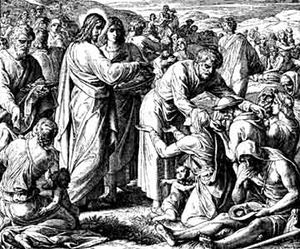Clergy

When Jesus appointed a kingdom to His little flock He was delegating a responsibility upon them. When He required them to "sell all they had" and follow Him, there was no such command to the general population.
While the ministers sold their property and owned all things common, the purpose of the Messiah was to set the captive free while returning everyman to his family and to his possessions.
Those called out ministers could be called a form of clergy, but their duties, responsibilities, and limiting criteria were defined by Christ and may not resemble modern forms of clergy. The engine that drives the kingdom of God, which is faith, is found in the heart and mind of the individual and it is fueled by the Holy Spirit.
Terms like clergy, laity, elder, father, wife, son, or daughter have their place when properly defined, but neither God nor the Holy Spirit are a respecter of persons.
Like the "Church in the wilderness"—which consisted of those ministers of a "Peculiar people" who were "called out" of the camp of the golden calf by Moses—those who were "called out" by Jesus played a pivotal role in serving the people of the early Christian community through the free practice of "Pure religion".
Certainly the early Church advocated a Daily ministration for the needy of the Christian community that was dependent on Charity only. It was not like the system of Corban of the Pharisees nor the free bread of Rome which compelled the offerings of the people. It was the practice of Pure Religion by the early church that brought them into conflict with Public religion and the Covetous Practices of the World. To understand the clergy of Christ it may be important to distinguish it from the clergyism of the Modern Church and the clergy of the world.
Clergy Audio 1
Download Recording Clergy 1
or press play
Clergy Audio 2
Download Recording Clergy 2
or press play
Other links
Ministers |
Why Minister |
Minister of the world |
Minister of the Church |
Elders |
Deacon |
Priests |
Levites |
Breeches |
Hierarchy |
Altars |
Stones |
Stoning
Daily ministration |
Corban |
Welfare |
Essenes |
Disciples |
Seven men |
Church |
Church legally defined |
Christian |
Churches |
Ministry Burnout |
Religion |
The Blessed Strategy |
Widow |
Tens |
Tithing |
CORE |
COM |
Minister of Record |
Benefactors |
Cain |
Nimrod |
Constantine |
Christian conflict |
Fathers |
Lady Godiva |
Isaac Backus |
Government and Liberty Described |
Monks |
Lost Monks |
Married Monks |
Monasticism |
Modern Monastic life |
Seek |
Votive |
Orders |
Religious Orders |
Rules of St Benedict |
Jesus |
Was Jesus rich |
Mendicant |
Vow of poverty |
Fervent Charity |
Denominations |
Guru theories |
Iconoclast |
Cult |
Bible Index |
First to do List |
Church |
Churches |
Ekklesia |
Called out |
Church legally defined |
Priests |
Minister |
Deacon |
Bishop |
Elder |
Clergy |
Laity |
Home church |
Early Church |
Religion |
Corban |
Storehouse |
Daily ministration |
The Way |
Rituals and ceremonies |
The Blessed Strategy |
Minister of the world |
Welfare types |
Socialism |
Public religion |
The Church chained |
Body of Christ |
Kingdom of God |
Levites |
The Free Church Report |
Church Study course online |
Unchurched |
Ministers |
Christians |
Modern Christians |
Christians check list |
Theology |
Lady Godiva |
Whosoever believeth |
Worship |
Salvation |
Creed of the Apostles |
Benefactors |
Cain |
Nimrod |
Constantine |
Christian conflict |
Fathers |
Patristic |
Ambrose |
Jerome |
If you need help:
- Or want to help others:
Join The Living Network of The Companies of Ten
The Living Network |
Join Local group |
About |
Purpose |
Guidelines |
Network Removal
Contact Minister |
Fractal Network |
Audacity of Hope |
Network Links